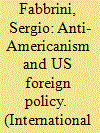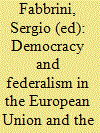|
|
|
Sort Order |
|
|
|
Items / Page
|
|
|
|
|
|
|
| Srl | Item |
| 1 |
ID:
099889


|
|
|
|
|
| Publication |
2010.
|
| Summary/Abstract |
From the end of the Cold War in 1991 to the end of the 2000s, anti-Americanism has passed through different phases in Europe, as well as in other parts of the world: it was modest in the 1990s, it exploded between 2003-2008, then declined after 2008. Although anti-Americanism continues to be rooted in many political cultures and experiences, its emergence in the post Cold War era seemed to be correlated to a United States foreign policy-making process unrestrained by either domestic or international institutions. When domestic and international multilateral checks have been unable to keep under control the exercise of US international power, then anti-Americanism has functioned as a sort of last resort critic on the latter. Anti-Americanism has seemed to be the reaction, more than to controversial foreign policy's decisions, to their unchecked elaboration and unilateral implementation. For world public opinion, the legitimacy of the foreign policy-making process counts more than the latter's outcomes.
|
|
|
|
|
|
|
|
|
|
|
|
|
|
|
|
| 2 |
ID:
154838


|
|
|
|
|
| Summary/Abstract |
The 2009 Lisbon Treaty institutionalised an intergovernmental constitution for managing policies traditionally a matter of national sovereignty, such as foreign and defence policies. However, important innovations were introduced in the foreign policymaking structure to limit its intergovernmental logic, in particular, with regard to the role of the High Representative (HR). It was generally assumed that those innovations would have made development of a coherent EU foreign policy possible. Yet, in one of the most significant tests for the EU’s foreign and defence policies in the post-Lisbon era, namely the Egyptian crisis (2011-14), those reforms did not work as expected. Notwithstanding the innovations, the HR’s role was diminished by the European Council’s strict control over foreign policy toward Egypt. The lack of clear policy guidelines towards the issue of democratisation in the Arab world in the 2003 European Security Strategy, although partially mitigated by the European Neighbourhood Policy and the Barcelona Process/Union for the Mediterranean, made it even more difficult for the HR to bring a European perspective into the largely intergovernmental setting.
|
|
|
|
|
|
|
|
|
|
|
|
|
|
|
|
| 3 |
ID:
086315


|
|
|
|
|
| Publication |
2008.
|
| Summary/Abstract |
While the major feature defining United States' (US) foreign policy since the Cold War has been the use of coercive means such as military power and economic sanctions, the European Union (EU) international role, despite recent attempts to develop military capabilities, remains that of a civilian power. The literature on transatlantic relations has explained this difference by stressing the different positions of the two actors in the international balance of power and pointing at their divergent value and normative frameworks. This article, by comparing the EU and US policy-making processes, introduces a further explanation. It argues that, although the two polities share the features of Compound Democracies, the different institutional organization of their foreign policy-making processes has generated powerful incentives for pursuing different kinds of international action.
|
|
|
|
|
|
|
|
|
|
|
|
|
|
|
|
| 4 |
ID:
058911


|
|
|
|
|
| Publication |
London, Routledge, 2005.
|
| Description |
x, 209p.
|
| Standard Number |
041533392x
|
|
|
|
|
|
|
|
|
|
|
|
Copies: C:1/I:0,R:0,Q:0
Circulation
| Accession# | Call# | Current Location | Status | Policy | Location |
| 049177 | 320.44049/FAB 049177 | Main | On Shelf | General | |
|
|
|
|
| 5 |
ID:
090635


|
|
|
|
|
| Publication |
2009.
|
| Summary/Abstract |
Although foreign policy changes reflect transformations in the international system, they are also strongly conditioned by domestic factors. This is particularly true in the United States. Domestic factors have affected US decision-makers' interpretation of the international system and the role their country should play in it. That interpretation has gone through various phases, each characterised by a predominant paradigm or a struggle between competing paradigms. If the period between 11 September 2001 and the 2006 mid-term elections witnessed the uncontested success of unilateralism, after those mid-terms and the elections of 4 November 2008, the necessary domestic conditions for a new multilateral paradigm may have been created.
|
|
|
|
|
|
|
|
|
|
|
|
|
|
|
|
| 6 |
ID:
105068


|
|
|
|
|
|
|
|